by Bruce Berlet || AHL On The Beat Archive
Facing pucks flying at him at more than 100 mph never seemed so easy, so mundane, so inconsequential to Connecticut Whale goalie Dov Grumet-Morris.
Not when you’re helping bury one of your best friends and former Harvard teammates after he committed suicide at 28.
But that’s what Grumet-Morris faced Jan. 11 at Tom Cavanagh’s funeral in East Greenwich, R.I.
Though it was one of the saddest days of his life, Grumet-Morris had taken a week off and been determined to do whatever was necessary to get to Rhode Island despite a major snowstorm in the Southeast. He was in Greenville, S.C., when informed of his friend’s unexpected death, and seemingly by the grace of God, he was able to board the only plane to leave town in 48 hours.
But Grumet-Morris had to switch his flight to fly west, to Dallas, before heading north, to Boston, and then renting a limousine service to drive him to Providence. He made it in time for the start of Cavanagh’s wake only because a stewardess held the other passengers in their seats so he could go from the back to the front of the plane and get off first.
“I don’t know if it was an act of God, but it was planes, trains and automobiles,” Grumet-Morris said. “It was a lot of hard work done by American Airlines that made it happen for me, and I’m very thankful for that.”
And the airline’s help didn’t stop there. After flying from Providence to Philadelphia at the start of his return trip, Grumet-Morris was booked on eight different flights and prepared to rent cars wherever he landed.
“The snow was so bad they didn’t know if anyone was going to be able to get in or get out,” said Grumet-Morris, who has a picture on his cell phone of him holding the eight tickets. “I ended up sleeping in the Philadelphia airport because they couldn’t get any flights out so it wasn’t an easy trip all around. But it wasn’t a question of whether I was going to do it. It was just a matter of how it was going to get done.”
While the trip and wake, where people waited in line as long as 3-1/2 hours in freezing weather, were difficult, the funeral was worse. Grumet-Morris didn’t notice two rainbows, one inverted in the shape of a smile, that appeared in the sky as Cavanagh’s parents, eight siblings and more than a thousand friends and former teammates gathered at the cemetery. Cavanagh’s father, Joe, said the rainbows were a sign, but Grumet-Morris viewed it a little differently.
“To me, that’s not really indicative of Tom or what was going on at the time,” Grumet-Morris said. “Whether it was raining or sleeting or snowing or sunny out, we were there to remember him and what he did. He was a very nice, quiet person, but the biggest thing that anyone who knew him, whether through athletics or on a personal level, is how hard of a worker he was.
“He was a very, very, very hard worker and lived by the warrior creed, so to say, where he would never – and I mean never – complain about anything, whether it was an injury or playing time or lack of playing time or overuse or underuse or not enough rest or too much rest. In the four years I played with him and the next six years I knew him, he never, ever complained about anything.”
To the outsider, Cavanagh’s death seemed unthinkable and surreal. He appeared to be a young man with everything. A Harvard degree. A hockey player who reached the pinnacle of his sport with the San Jose Sharks in 2008. A friendly, engaging personality. A coach’s dream.
“He probably was the most low-maintenance player I have ever been around,” Harvard coach Ted Donato, whose 13-year pro career included stints with the Boston Bruins, New York Rangers and Hartford Wolf Pack, said at the time of Cavanagh’s death. “You couldn’t get him to miss a practice…. He was wonderful. He probably spoiled me for the rest of my coaching life. He was the guy we compared all the other players to. He played hard. He played through everybody, and he was a perfect gentleman off the ice.”
Cavanagh also “fought the demons of mental illness for many years,” according to his father, a prominent Rhode Island lawyer, three-time All-American at Harvard and a member of the U.S. Hockey Hall of Fame. The demons died on Jan. 6 when Cavanagh locked his car in the Providence Place Mall parking lot and jumped to his death from an upper level. It was only then that most people realized Cavanagh had accomplished so much so quickly despite almost totally concealing he had been diagnosed with schizophrenia and suffered a series of psychotic episodes that forced him to be institutionalized four times in his final months.
The day Cavanagh committed suicide he had an appointment with his doctor, whom his father called to say his son had seemed especially depressed the previous few days. The doctor called that night to say Cavanagh had not shown up for the appointment. Cavanagh also missed a dinner date with his girlfriend. Later, a Providence policeman broke down as he delivered the news to Joe Cavanagh that his son had died of “multiple traumatic injuries due to blunt force impact.”
Though Cavanagh had played with Grumet-Morris for four years, stayed over at his house and been at his bachelor party, Grumet-Morris was unaware of Cavanagh’s condition.
“That was a private issue and that was Tom, a very private person,” Grumet-Morris said. “Much the way he dealt with his physical pain from hockey by internalizing it, he did the same thing with the struggles that he had (mentally). He would never want to put his problems or the onus of his issues on anybody else. That’s the way he lived, and that’s the way he was.
“I spoke to him during this season in particular because I was in Hartford and he was in Springfield (with the AHL Falcons). We spoke several times a month, if not every week, whether through e-mail, texting or phone call, so I was very close to him, and I never got an inkling (of trouble). I knew him for 10 years, so if I couldn’t pick up on it, then you would have to be literally in his family to know. And I’m sure there were members of his family who didn’t know.”
Falcons president and general manager Bruce Landon said no one in the franchise knew of Cavanagh’s problems after he was brought in to try to add some offense after the parent NHL Columbus Blue Jackets tried to sign him last season. Cavanagh had one assist in five games before injuring his shoulder in a 2-1 victory over the Providence Bruins on Oct. 15 at the Dunkin’ Donuts Center, not far from where he grew up. His final game was two days later, a 3-1 Falcons victory over the Manchester Monarchs. He was released on Nov. 10.
“He was a good kid who was a little bit quiet, at least around me,” Landon said. “He got along and mingled well with the other players and seemed like a good, normal, very polite young man when I talked to him about a lot of different things.
“Obviously he had had some issues in the past and some hockey-related injuries. He played well in spurts, but then he was hurt so we didn’t really get a chance to see enough of him. He had been a good American Hockey League player throughout his career, especially in Worcester (he’s the Sharks’ career leader in assists, 96, and points, 138, in 202 games), but he got the injuries. But he got along well with his teammates, and the guys liked him. It’s a very sad story.”
Cavanagh played in 18 NHL games with the San Jose Sharks, scoring his only goal on March 28, 2009, in a 3-2 victory over the Phoenix Coyotes. He overcame wrist, knee and shoulder injuries to continue to play with the Falcons, considered law school so he could follow in the footsteps of his father and sister and was trying hard to understand what was wrong with him.
Cavanagh’s search ended in the worst way imaginable, but his father found some solace.
“As tragic as this is, it’s a relief that he’s out of his torment,” Joe Cavanagh said. “He’s not suffering anymore.”
Grumet-Morris has performed well for the Wolf Pack/Whale and the ECHL’s Greenville Road Warriors this season, but it turned somewhat bittersweet as the trauma of Cavanagh’s suicide lingered. He credits his wife, Rachel, with helping him deal with the grief of losing such a close friend. After eight years of medical school and time as a general surgeon, Rachel is finishing her second year of residence for a two-year research position in surgical oncology in Houston, where the couple will move after the season.
“In her position, she deals with death on an everyday basis,” Grumet-Morris said, “so she definitely knows what it feels like, both from a personal level and a professional level and how it can affect your job. Let’s be honest, we’re all human and we all have emotion, and whether we like it or not, we try to partition things away from our work, but it definitely has an effect.
“So she definitely has helped me, and that’s one of the many benefits of being married, that you have your life to share with someone and don’t have to go it alone, so to speak. It’s a process where you talk about it and think about it a lot at the beginning, and then as you try to put the pieces back together and try to go back to some level of normalcy, it starts to fade a bit. It’s not in a bad way, but the reality of the situation is you have to continue your life and have to not forget but learn and keep that as a lesson and move on.
“I still talk about it and think about it quite a bit. It’s not as if it’s something that has faded from memory. It’s just not something that has to be brought up in every subject on an everyday basis with friends and family.”
Playing only two games in four weeks in January and early February gave Grumet-Morris time to put things in perspective.
“It’s tough to lose anyone,” he said, “but anytime you lose a friend it has a connection, especially when he’s a young man and you’re a young man. I don’t know of any 20-year-olds who died, so for me, it’s the first time I’ve had to deal with it. I’ve had grandparents who passed away, but the way my father put it, ‘Grandparents die, that’s what happens. They get older, and they die. You’re young.’
“If you’re a teenager when it happens, it’s something where they’re 60 or 70 or 80 years old and have lived a very long and very full life, and you expect that it’s going to happen eventually. You know it has a certainty. But when you lose someone who’s close to you and who’s very young, you regret and you mourn because of the loss of the potential. You don’t know what they could have accomplished, whether it’s in hockey or in life, what kind of family they could have had, what kind of legacy they could have left behind.
“So that’s a lot of the mourning that goes on. You feel like you missed out on an opportunity to engage with them in their life, and they missed out on an opportunity to engage with you and others and the world at large. That’s why parents hate to outlive their kids because they feel like they haven’t reached their full potential. And I don’t mean in the sense of success or failure but in the sense of living a full and complete and enriched life.”
Grumet-Morris started his full and enriched life in Evanston, Ill., where he grew up with three brothers and two sisters and played hockey and baseball.
“I had five siblings and Tom had eight, so that always was a connection we had, too,” Grumet-Morris said.
Grumet-Morris started skating at 3 years old under the tutelage of his father, who did his residency at Northwestern University and worked at a hospital across the street from the family’s house. Dov played on his first team at 4, and his early skating partners included his older sister, Aviva, who later was a defenseman at Princeton.
Appropriately, Grumet-Morris was mainly a catcher in baseball through high school and played on Triple-A hockey teams that traveled throughout the Midwest because the competition in Chicago youth hockey was limited. Ironically, his favorite goalie was Mike Richter, the retired Rangers legend whose No. 35 is retired and hanging in the Madison Square Garden rafters.
“He was such a great athlete and great skater, which is very important,” Grumet-Morris said. “He wasn’t the biggest guy, but he was just such a technically sound goaltender. I really admired him, his style of play and what he was able to accomplish.”
Grumet-Morris also was a fan of the defending Stanley Cup champion Chicago Blackhawks, and got interested in the Ivy League and ended up at Harvard largely because of its educational benefits, strong hockey program and his sister attending Princeton. He graduated with “a dual concentration” in Government and Near Eastern (Mideast) Languages and Civilizations largely because his first day of class was Sept. 12, 2001.
“The terrorist attacks pushed me in that direction,” Grumet-Morris said of his dual majors. “That was a ‘Where were you when?’ kind of moment, the same as my parents for the John F. Kennedy assassination or when man landed on the moon or Dec. 7, 1941. For my generation, 9/11 will always be that “Where were you when?’ moment.”
Grumet-Morris was part of a major recruiting class with Cavanagh, a leading prep school player in Rhode Island, and defenseman Noah Welch, a second-round pick of the Pittsburgh Penguins in 2001 now with the AHL’s Chicago Wolves. The three won numerous awards, with Grumet-Morris and Welch being named All-Americans in their senior year while leading the Crimson to two ECAC titles and four NCAA Tournament appearances.
“Tom, Noah and I had opportunities to leave, but all we wanted to stay and finish what we started,” Grumet-Morris said. “The three of us, and three others, always thought we were kind of brothers. We lived together, we played together, we worked out together, we worked together in camps, we had beers together. I came from a family of four brothers, so it was all very similar for me.”
Grumet-Morris graduated in 2005 with a 63-40-9 career record, 2.25 goals-against average, .924 save percentage, school-record 11 shutouts and a promising future after being a fifth-round pick of the Philadelphia Flyers three years earlier.
After Grumet-Morris signed an NHL contract with the Nashville Predators on July 2, 2007, and then had his best statistical season while going 24-7-1 combined with the ECHL’s Cincinnati Cyclones and AHL’s Milwaukee Admirals. But the Predators, whose top affiliate is Milwaukee, had Pekka Rinne, now one of the best goalies in the NHL, so Grumet-Morris decided to go to Europe, spending the last two seasons in Austria and Slovenia.
“I just didn’t get a chance to play much because of Rinne,” Grumet-Morris said. “I only played nine games in the AHL and wanted an opportunity to play more. I went to Europe and got to play (96) games, so I had an opportunity to build my resume and confidence.”
He also expanded his horizons on many fronts.
“I loved living in Europe,” he said. “The quality of life is higher there than it is here. When I’m there, I’m a professional athlete making a decent wage and have a whole organization to support me and pay for my housing and cars, so I don’t have to deal with much. And the quality of the infrastructure of the countries I lived in is significantly higher than the United States. Things like highway bridges and recycling centers is much higher quality, and there’s a very, very, very high emphasis on environmental protection, so the landscape is absolutely gorgeous and pristine.”
Before and during his stint in Europe, Grumet-Morris won gold medals in the World Jewish Championships in Israel in 2007 and 2009. He shut out Canada 6-0 in the finals two years ago, when he was a player/coach and affectionately called “Reg Dunlop,” after the character that Paul Newman played in the famous hockey movie “Slap Shot.”
“I’d love to do it again if they have it, especially after being able to take a pretty big role in the 2009 tournament,” Grumet-Morris said. “It was actually pretty tough because not only was I playing, but you’re making sure there are water bottles and pucks and doing practice schedules and lines and working on some drills and some systems. Then when we had an off-day that was a travel day, I was always the person in charge of making sure everyone is there. On top of that, I was the only one on the team who spoke Hebrew, so I would translate for the group if someone was giving a tour in Hebrew.
“It was actually a very daunting trip, but I loved it and had a great time. And one of my brothers, 20-year-old Amit, a forward, was able to come on the trip and play as well, so that’s always fun.”
Despite his success and enjoyment in Europe, Grumet-Morris wanted to be closer to his wife, who had remained in the United States, and to play again in North America in the AHL with an eye toward the NHL.
“I’d played in the AHL before, but I wanted to come back and try it again because this is the second-highest league in the world,” Grumet-Morris said. “The level of professionalism is incredibly high, and I very much enjoyed that, the challenge and the intensity of the AHL. I had lessons to learn, and I achieved what I wanted to achieve in Europe and thought there was always a chance I could make it to the NHL.
“(Boston Bruins goalie) Tim Thomas spent 10 years in the minors before he went to the NHL. I’m not trying to compare myself to him, but there’s always a chance. Look at our situation with (Martin) Biron out in New York. Henrik (Lundqvist) is realistically going to play every day, but there’s still an opening.”
During his time in Europe, his ECHL rights were traded to Greenville, and coach Dean Stork asked their new AHL affiliate in Hartford to allow Grumet-Morris to attend their camp in September.
“We had our four goalies, and Greenville wanted to look at some goalies and brought Dov in,” Gernander said. “We had liked what we saw in the past, and he was very professional, worked very hard and was very competitive. He had a lot of attributes that we liked, so if we were in need of a goalie, we were comfortable with recalling him and he has played very well for us.”
Grumet-Morris has split the season between the ECHL and AHL but has made the most of his time in Hartford, going 11-5-1 in 19 appearances with a 2.06 goals-against average and a .925 save percentage.
“My season has gone as well and as fast as I could have hoped,” Grumet-Morris said. “Coming back without a contract, I’ve worked my way up. I had an outstanding (time) in Greenville and was one of the pieces that helped put that team in first place. Coming to Hartford, I was able to contribute right away and help chip in but also take a leadership role in a sense when we were down as far as injuries and illness and even had an emergency backup for a couple of games.
“I was able to help and stabilize a situation, so I definitely feel at home in Hartford and feel I’m a part of the team. I think overall the season has gone exactly as I could have planned it.”
But Grumet-Morris liked his new-found stability more for his wife than himself.
“It’s hard when someone asks, ‘OK, I want to come and visit?’ or my parents want to come and see a game because they essentially can’t come and make any plans because on any given day you can be sent down,” Grumet-Morris said. “You can practice in the morning and get released at night, so it’s very difficult. But it’s professional hockey, and you have to accept that as a rule if you’re a non-contracted goaltender. And if you don’t like it, you can always quit.”
Grumet-Morris has never quit on anything, just like friend Tom Cavanagh, whose brother-in-law played with them at Harvard and whose sister married one of their teammates. Injuries might have hampered Cavanagh’s career, but they never stopped him.
“One story that never really got out to the public was that in mid-January of his senior year he had been playing with an injured knee, but he never complained,” Donato said, echoing the sentiments of Grumet-Morris. “Finally he went to the doctor and learned he had totally torn his ACL. The doctor said he couldn’t do any more damage, but he was going to need an operation that would require six to eight months’ recovery.
“I found out at 5:30 before a 7 o’clock game that night, so I met with Tom and told him he had been an unbelievable contributor to our program, that he had done everything we could ask. So if he wanted to leave the team and have the operation immediately to put himself in a better position to play professional, I and his teammates would understand. He said, ‘Coach, I want to keep playing. I want to play for Harvard.’ Sure enough, that night in the third period he scored the winning goal.”
Not surprising to those who continue to regret and mourn the loss of a good, polite young man.






































